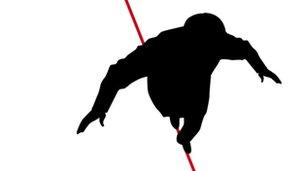Why ministers are walking an NHS tightrope
- Published
- comments

The next few months could be crucial for the government in terms of the NHS
In his evidence to MPs, NHS chief executive Sir David Nicholson described the current moment in time as one of "maximum risk".
He was talking about the health service, but the term could equally be applied to the government.
It is easy to forget that just over a year ago ministers were fighting to save their health reforms - and perhaps even the coalition itself.
As Sir David pointed out as he was grilled by members of the Health Select Committee over his handling of the Stafford Hospital scandal, the coming weeks will see the whole structure of the health service redrawn.
More than 160 organisations will be abolished and another 200-plus will be created in their place, including the NHS Commissioning Board, which Sir David will run.
Come 1 April they will take charge of the health service in England with its budget in excess of £100bn and workforce of 1.3m.
Reorganisations on such a vast scale are never easy.
As Sir David testified on Tuesday, the risk is that as they happen - as in 2005-06 when he was in charge of the health authority that oversaw Stafford - eyes are taken off the ball.
In one of the more revealing exchanges, he said the system at the time had lost its focus as it juggled the task of merging organisations. Patients were not put first - and that had catastrophic consequences.
Back then the reform only involved halving the number of primary care trusts and health authorities.
This time round the upheaval is much greater.
Indispensable
Look no further than the furore over the past week over the regulations governing procurement in the NHS for proof of how distracting change can be.
Instead of focusing on patients and introducing the changes, doctors have been up in arms about what they saw as a breach of the carefully structured compromise that won them over back when ministers were trying to get their bill through Parliament.
In return for the profession's support - or at least not outright opposition - ministers provided assurances about the extent to which competition would be pursued.
The regulations are now being rewritten.
When they are put forward again, expect them to be gone through with a fine-tooth comb.
What this all illustrates is how toxic the reforms have become for the government.
But this is unlikely to be the end of it.
Ruth Thorlby, a senior researcher at the Nuffield Trust think tank, predicts the NHS will be a highly political issue for some time.
"The combination of the disorganisation caused by the upheaval and the money running out is destined to come together to create problems."
But it also explains why in many ways Sir David is indispensable despite the calls for him to go.
As one person who has worked with him at the Department of Health says: "He is the man the prime minister trusts to see through the changes."
When the controversy over the reforms were at their peak it was not Andrew Lansley who had a hotline to David Cameron, it was Sir David.
He has been leading the health service since 2006. He has experienced reorganisation, sorted out financial problems and his presence at the helm helped reassure those who work in the NHS that the government's health policy could work.
Without him, ministers fear they will slip from the tightrope they are walking.